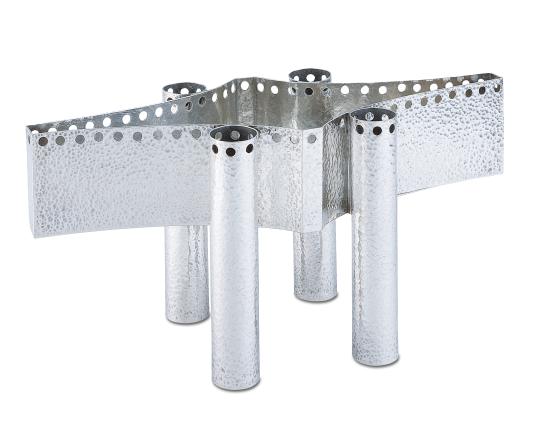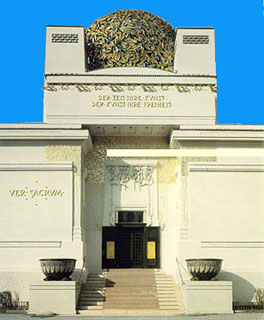The Wiener Werkstätte .....
The Wiener Werkstätte (meaning the Vienna Workshop) was
a cooperative which developed from the Vienna Secession of the late 19th century – a group of designers and architects who wanted to find out a new form
of art for the new century. The Secession wanted to unite the fine arts
(painting, sculpture and architecture) with the applied arts, and bring
equality between them. Three persons founded the Wiener Werkstätte in 1903 - the Secessionist
designers Josef Hoffmann and Koloman Moser and the rich banker Fritz Wärndorfer.
Wikipedia, (2013), Josef Hoffman [ONLINE].
Available at:
[Accessed 29 October 13]
 Wikipedia, (2013), Koloman Moser [ONLINE].
Available at:
[Accessed 29 October 13]
A sports trophy (silver, gilt, malachite) designed by Josef Hoffman in 1902: 
NGV, (2011), English inspiration, [ONLINE].
[Accessed 29 October 13]
A jardinière designed by Koloman Moser in 1903:

NGV, (2011), Modern Style, [ONLINE].
Available at: http://www.ngv.vic.gov.au/vienna/decorative-arts/wiener-werkstatte
[Accessed 29 October 13]
The Charles Ashbee’s Guild of Handicraft (founded in
London in 1888) was one of the British associations of craftsmen and designers on
which the Wiener Werkstätte was established, with the aim of producing
fashionable household items and revealing the beauty of art through
craftsmanship.
The English designer Charles Robert Ashbee:

Blogger, (2010), ARTS ALMANAC-, [ONLINE].
Available at: http://foggygates.blogspot.com/2010/05/group-of-seven-fossil-collectors.html
[Accessed 29 October 13]
A pendant (silver, gold garnet and pearl) designed by Charles Robert Ashbee in 1897: 
artnet.com, (2013), Superb Guild of Handicraft Pendant, [ONLINE]. Available at: http://www.artnet.com/artwork/424634487/119156/charles-robert-ashbee-superb-guild-of-handicraft-pendant.html
[Accessed 29 October 13]
|
The exterior of the Vienna Secession: Modernism, (2013), wiener werkstatte, [ONLINE]. [Available at]: http://www.artsmia.org/modernism/rintro.html [Accessed 29 October 13]
Several workshops – for silver/goldsmith works,
metalwork, book-binding, leatherwork and cabinet-making – were set up within a
few months after the Wiener Werkstätte was founded. Apart from the workshops, they had an
architectural office that used to belong to Josef Hoffman, as well as a design
studio.

Mia Minneapolis Institute of Arts, (2013), WIENER WERKSTÄTTE [ONLINE].
Available at: http://www.artsmia.org/modernism/rintro.html
[Accessed 29 October 13]
The Wiener Werkstätte treated their designers and
craftsmen equally. In fact, the products
used to bear the initials of not only the designers, but also of the
craftsmen. The conditions of the workers
were very good too, for example craftsmen working on cabinet-making used to get
paid for one or two weeks of leave, and this was unheard of at that time.
The members of the Wiener Werkstätte concentrated
on simple shapes and patterns, and also on minimal decoration. They were after good design and quality. Hoffman used to make sure that the best available
materials were always used. He used to
say, 'Since it is not possible to work for the whole market, we will
concentrate on those who can afford it.'
In fact, their regular customers were rich people. Because of this, the Wiener Werkstätte did
not succeed much financially, but on the other hand, two years after its
foundation, it was the most important arts and crafts organization in Vienna
and it had over a hundred employees by then.
The Wiener Werkstätte and its products became
well-known through various journals and exhibitions (even international). Between 1903 and 1932 it had over two hundred
designers working on their products that included furniture, glassware,
metalware, textiles, jewellery, clothing, wallpapers, ceramics and also
graphics. The Wiener Werkstätte was also
responsible for three remarkable projects:
Unfortunately, although the Wiener Werkstätte was
successful and it had also set up branches in New York (1921) and Berlin
(1929), it ceased to operate in 1932 (since it was compelled to liquidation).
artsmia. (2007). Modernism: Wiener Werkstätte . [Online Video]. 13 June.
[Accessed: 29 October 2013]
|
Other References:
Wiener Werkstatte, (2013) Modernism,
[Available at]: http://www.artsmia.org/modernism/rintro.html,
{Accessed 29 October 2013]
[Available at]: http://www.artsmia.org/modernism/rintro.html,
{Accessed 29 October 2013]
Melborne Winter Masterpieces vienna Art and Design, (2011) NGV,
[Available at]: http://www.ngv.vic.gov.au/vienna/decorative-arts/wiener-werkstatte,
[Accessed 29 October 2013]
[Available at]: http://www.ngv.vic.gov.au/vienna/decorative-arts/wiener-werkstatte,
Wiener Werkstaette, (2013) Woka Lamps Vienna ,
[Available at]: http://www.woka.com/en/design/designer/wiener-werkstaette/,
[Accessed 29 October 2013]
[Available at]: http://www.woka.com/en/design/designer/wiener-werkstaette/,
[Accessed 29 October 2013]
Book: Fiell, C.F and P.F, 1999. Design of the 20th Century. 2nd ed. Germany: Taschen

No comments:
Post a Comment